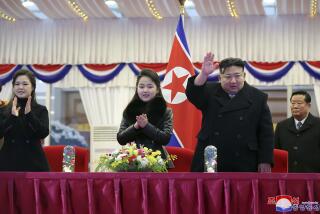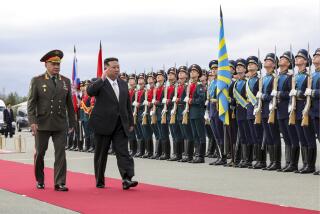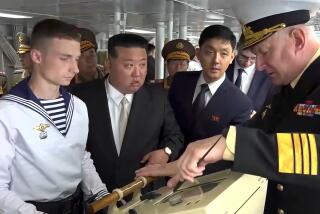North Korean leader, youngest son on trip to China, South says
Reporting from Seoul and Beijing — In a trip shrouded in mystery and speculation, North Korean leader Kim Jong Il traveled to China by train with his youngest son, according to two South Korean government officials.
An official in the South Korean Blue House confirmed late Thursday that Kim’s train had crossed the border into China around midnight Wednesday, but said the North Korean leader did not take the usual route through the city of Dandong.
We “detected indications a few days ago,” the official told reporters, asking not to be named. “Chairman Kim’s special train has been confirmed to have left Manpo for China’s Jilin around midnight Wednesday.”
Another official, who asked not to be named because he was not authorized to discuss the matter, said earlier that intelligence had detected movement by the reclusive Kim.
South Korea’s Yonhap news service quoted an official speculating that the trip might be associated with the anticipated handover of power in the secretive regime.
“Signs have been detected that Chairman Kim visited China early Thursday morning,” the second unnamed official told the agency. “We are still trying to grasp his exact destination and the purpose of the visit.”
This was Kim’s second trip to China since May, when he embarked on a five-day journey for a summit with Chinese President Hu Jintao.
The Chinese government Thursday had no immediate comment on the visit. Because of security concerns, Kim’s rare trips outside North Korea to the ally nation are publicly confirmed only after they end.
The Yalu River crossing between North Korea and the Chinese city of Dandong was badly flooded last weekend, disrupting the railroad lines over which Kim normally travels in an armored, luxury train, reportedly equipped with conference rooms, bedrooms and high-tech communication facilities.
Shi Yinhong, a professor at Beijing’s Renmin University, speculated that Kim “must need China’s help in reducing tensions and ensuring a good environment for the succession of his son.”
The visit may signal that North Korea is prepared to return to six-party talks hosted by China on its nuclear program. North Korea also badly needs humanitarian assistance as a result of a series of economic blunders, as well as poor harvests and damage to cropland caused by the recent flooding.
Kim, who is 68 and in poor health after suffering a stroke in 2008, is in the process of naming his youngest son, the little-known Kim Jong Eun, 26, as his successor, a decision which should be announced at a special congress next month of North Korea’s ruling Workers’ Party.
“It’s likely that Kim Jong Il wants to end the debate on the succession issue in Pyongyang ahead of a meeting next month of the North Korea’s Workers’ Party,” said Yang Moo-jin, a professor at the University of North Korean Studies in Seoul.
“There’s been plenty of succession talk between working-level and senior-level officials in Beijing and Pyongyang where they have failed to reach an agreement. Kim Jong Il now seems to be taking matters into his own hands.”
Kim Jong Eun, who was educated in Switzerland and speaks several languages, did not accompany his father during the previous trip to China in June. His presence on this visit might be something of a courtesy call to introduce the future leader to the Chinese.
“China will have no choice but to deal with Kim Jong Eun. Their regime is traditionally a family dynasty and, like it or not, if you deal with North Korea, you have to deal with their ruler,” said Shi.
Kim Jong Il assumed power in North Korea with the death of his father, Kim Il Sung, in 1994.
The rumors come amid tensions on the Korean Peninsula following the deadly sinking of a South Korean warship in March. The south has blamed North Korea for an unprovoked torpedo attack.
The trip also comes the day after former U.S. President Jimmy Carter arrived in Pyongyang to secure the release of a U.S. citizen imprisoned for illegally entering the country.
john.glionna@latimes.com barbara.demick@latimes.com Glionna reported from Seoul and Demick from Beijing. Ethan Kim in The Times’ Seoul bureau and Tommy Yang and Nicole Liu in the Beijing bureau also contributed to this report.
More to Read
Sign up for Essential California
The most important California stories and recommendations in your inbox every morning.
You may occasionally receive promotional content from the Los Angeles Times.











